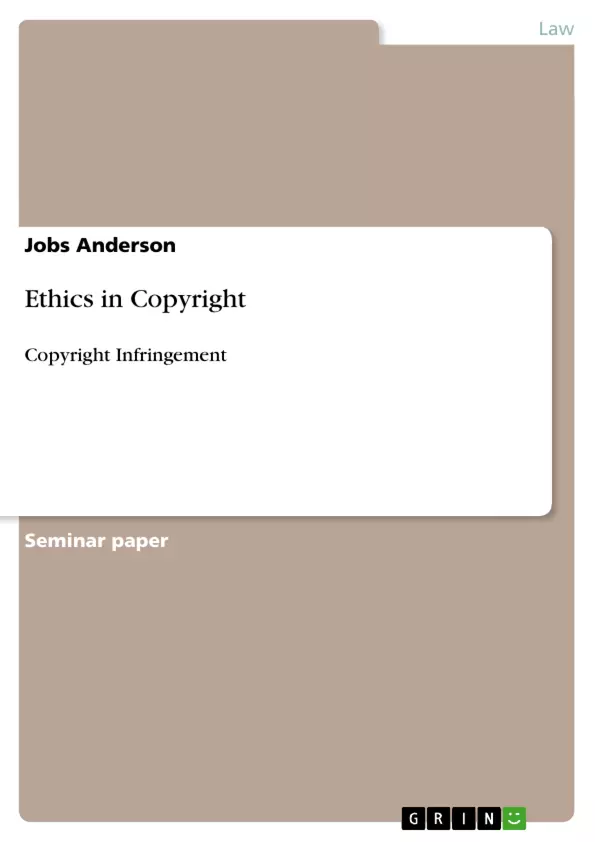Copyright infringement or what is termed as copyright violation is use of any material that is covered by copyright law in an unlawful manner whereby violating the rights of the copyright owner. Such rights include the right to reproduce the copyrighted work. In regard to audio-visual material, unlawful reproduction as well as distribution of these materials is mainly known as piracy. Copyright infringement is both unlawful and unethical therefore it is a prosecutable crime. This paper give a brief examination of copyright law and provides an account of how legal action can be taken if a person infringes the copyrights of an owner. The paper as well looks at the ethical aspect of copyright before giving a conclusion.
Inhaltsverzeichnis (Table of Contents)
- Introduction
- Copyright infringement
- Copyright infringement
- Examples
- Legality
- Infringement suit in the United States law
- Ownership of legitimate copyright
- Actual copying
- Misappropriation
- Subtractive method
- Totality method
- Ethical aspect of copyrights
Zielsetzung und Themenschwerpunkte (Objectives and Key Themes)
This paper aims to provide a concise overview of copyright law, particularly focusing on copyright infringement and its ethical dimensions. It outlines legal actions that can be taken in case of copyright infringement, explores the ethical aspects of copyright, and delves into the legal framework surrounding infringement suits in the United States.
- Copyright infringement and its legal framework
- Ethical considerations of copyright
- Legal action against copyright infringement
- The application of the "Fair Use" principle
- The impact of technology on ethical issues related to copyright
Zusammenfassung der Kapitel (Chapter Summaries)
The introduction provides a brief overview of copyright infringement, defining it as the unlawful use of copyrighted material, including the right to reproduce the work. It emphasizes the illegal and unethical nature of copyright infringement, highlighting its status as a prosecutable crime.
The subsequent section delves into the concept of copyright infringement, exploring the limitations placed on the use of written material. It explains the "Fair Use" principle, which allows for the use of short, direct quotes from published materials with proper citation. However, longer quotes require permission from the copyright owner.
A further exploration of copyright infringement is provided, explaining it as a common law or statutory law protecting artists, authors, and developers from unauthorized reproduction of their work. Title 17 of the United States code outlines specific rights granted to copyright holders, including the right to reproduce, distribute, perform, and display their work.
The paper then examines various instances of copyright infringement, with particular focus on illegal downloading of music files and unauthorized copying of promotional DVDs.
The section on "Legality" discusses the international Berne Convention, which aims to protect copyright rights. It mentions the United States' adherence to the convention but with an exception regarding moral rights. While the United States offers less protection against infringement of moral rights, it recognizes fair use as a defense.
The paper further explores the legal process of pursuing an infringement suit in the United States. It outlines the steps involved, emphasizing the necessity for the copyright holder to prove ownership, actual copying, and misappropriation.
The section on "Ownership of legitimate copyright" examines the legal requirements for establishing ownership, including authorship of the original work in a tangible media and, although not mandatory, registration of the copyright. The paper also clarifies that works comprising facts, processes, or methods are not eligible for copyright protection.
The "Actual copying" section focuses on proving that copying occurred. It discusses both direct and indirect evidence, emphasizing the need to demonstrate a close similarity between the copyrighted work and the alleged copy, as well as evidence of access to the original work.
The section on "Misappropriation" examines the appropriation of copyrightable elements. It underscores the importance of demonstrating that the defendant appropriated protected elements from the copyrighted work and that the intended audience would perceive significant similarities between the works.
The paper concludes by discussing the ethical aspect of copyright, highlighting the lack of significant attention paid to ethical issues surrounding copyright and intellectual property. It argues that ethical considerations extend beyond individuals to corporations that may engage in unauthorized copying and distribution of copyrighted materials.
Schlüsselwörter (Keywords)
This paper explores key concepts such as copyright infringement, copyright law, ethical implications of copyright, legal action, fair use principle, Berne Convention, and misappropriation.
- Quote paper
- Jobs Anderson (Author), 2010, Ethics in Copyright, Munich, GRIN Verlag, https://www.grin.com/document/270049



